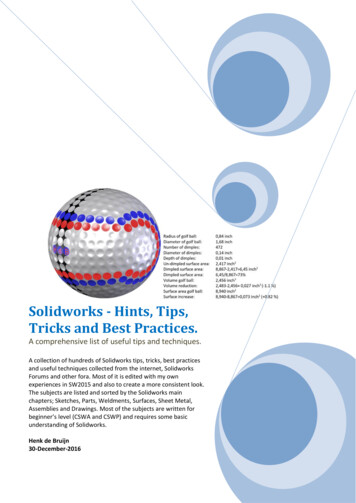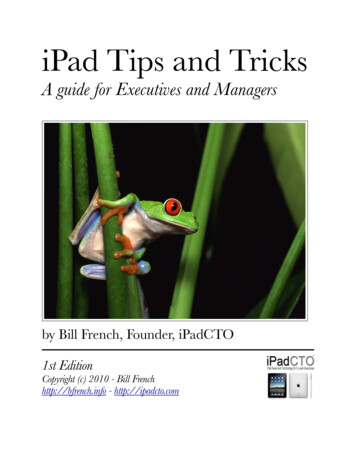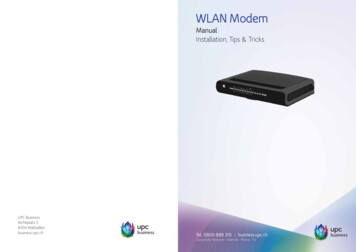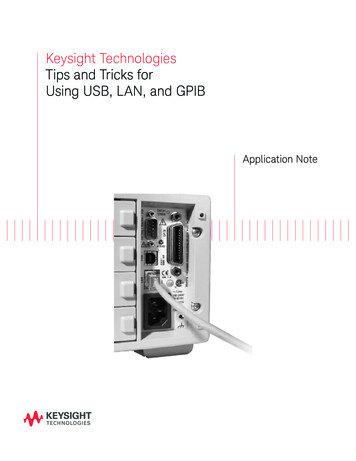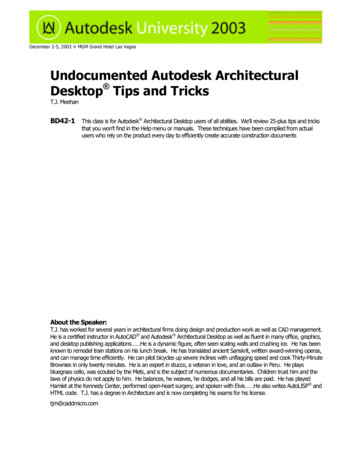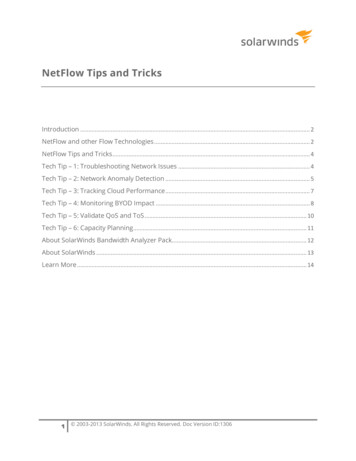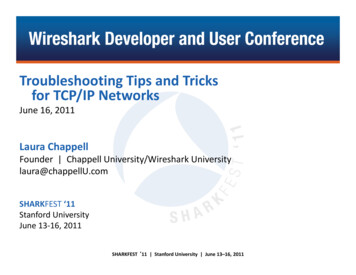
Transcription
Troubleshooting Tips and Tricksfor TCP/IP NetworksJune 16, 2011Laura ChappellFounder Chappell University/Wireshark Universitylaura@chappellU.comSHARKFEST ‘11Stanford UniversityJune 13‐16, 2011SHARKFEST ‘11 Stanford University June 13–16, 2011
The “Top 10” Issues1.2.3.4.Packet lossClient, server and wire latencyWindow scaling issues (RFC 1323)Service response issues and applicationbehavior5. Network design issues (wired/wireless)6. Path issues (such as QoS)7. Itty Bitty Stinking Packets (Low MSS Value)8. Fragmentation9. Timing problems10. Interconnecting devicescopyright chappellseminars.comSHARKFEST ‘11 Stanford University June 13–16, 2011
Hot Tips for TCP/IP Troubleshooting Build a troubleshooting profile* Recolor Window Update packets to green background(should not be “Bad TCP” coloring) Filter on ports, not protocols(e.g., use tcp.port 80rather than http) Always watch the time column –some networking is just ugly Watch for both Retransmissions andFast Retransmissions in the Expert*** See Laura’s Lab Kit v10** as noted in the session – filter on tcp.analysis.retransmissionswill show both standard and fast retransmissions!SHARKFEST ‘11 Stanford University June 13–16, 2011
Hot Tips for TCP/IP Troubleshooting Recognize a “short TCP handshake” – data is containedin the third handshake packet Expand the Conversation window to view Duration Enable TCP Conversation Timestamps(TCP protocol setting) – column? Click through the IO Graph –Don’t troubleshoot red herrings Know the definition of eachTCP analysis flag Watch the handshakes!* See Laura’s Lab Kit v10SHARKFEST ‘11 Stanford University June 13–16, 2011
Your TCP/IP Troubleshooting ProfileISO image online atlcuportal2.comSHARKFEST ‘11 Stanford University June 13–16, 2011
The All‐Important HandshakeFocus on: Window Size OptionsSHARKFEST ‘11 Stanford University June 13–16, 2011
TCP cp‐parameters.xmlSHARKFEST ‘11 Stanford University June 13–16, 2011
The Ideal Handshake MSS is decent size Window Scaling is enabled and shift factor isOK (watch out for a shift factor of 0) SACK is enabled Timestamp is on for high speed links (PAWS) Taken at client, the RTT is acceptableSHARKFEST ‘11 Stanford University June 13–16, 2011
PAWS (RFC 1323) Protection Against Wrapped SequenceNumbersSHARKFEST ‘11 Stanford University June 13–16, 2011
The Problem Handshake #1RouterSwitchMSS 1460WinScale x4SACKMSS 1460WinScale x1SACKMikeSHARKFEST ‘11 Stanford University June 13–16, 2011
The Problem Handshake #1Uh oh only500 bytes receivebuffer space –YourWinScalex1I’ll stopsendingSwitchRouterAck WinSize: 500 (x4)MikeWinScale x4SHARKFEST ‘11 Stanford University June 13–16, 2011
The Problem Handshake #2MSS 1460WinScale x4(You don’t SACKso I won’t either)RouterSwitchMSS 1460WinScale x4SACKMSS 1460WinScale x4MikeSHARKFEST ‘11 Stanford University June 13–16, 2011
Let’s Analyze a Problem10.3.8.209NAT/FirewallLoad ST ‘11 Stanford University June 13–16, 2011
Let’s Analyze a capNAT/FirewallLoad Balancertcp-problem-pointB.pcapMikeSHARKFEST ‘11 Stanford University June 13–16, 2011
Connection at Point ASYNSYN/ACKNAT/FirewallLoad BalancerMikeSHARKFEST ‘11 Stanford University June 13–16, 2011
Connection at Point BSYNSYN/ACKNAT/FirewallLoad BalancerMikeSHARKFEST ‘11 Stanford University June 13–16, 2011
Connection at Point CSYNSYN/ACKNAT/FirewallLoad BalancerMikeSHARKFEST ‘11 Stanford University June 13–16, 2011
The BeliefsNAT/FirewallMy WinScale x256131,840 bytesMikeSHARKFEST ‘11 Stanford University June 13–16, 2011
The BeliefsSwitchNAT/FirewallYour WinScale x1515 bytes availableMikeSHARKFEST ‘11 Stanford University June 13–16, 2011Switch
What About this Issue?SHARKFEST ‘11 Stanford University June 13–16, 2011
Use Wireshark TCP Analysis Flags tcp.analysis.flagstcp.analysis.lost t retransmissiontcp.analysis.duplicate acktcp.analysis.out of ordertcp.analysis.window fulltcp.analysis.zero windowSHARKFEST ‘11 Stanford University June 13–16, 2011
BTW: TCP Preferences Change Change to relativesequence numberssettingSHARKFEST ‘11 Stanford University June 13–16, 2011
BTW: Using a Heuristic DissectorEtherType 0800 (IP)IP: Type 6 (TCP)TCP: Port 80 (HTTP)HTTP DissectorSHARKFEST ‘11 Stanford University June 13–16, 2011
Coloring RulesQuestions?laura@chappellU.com(download the ISO of LLK10 atlcuportal.com)SHARKFEST ‘11 Stanford University June 13–16, 2011
SHARKFEST ‘11 Stanford University June 13–16, 2011
Hot Tips for TCP/IP Troubleshooting Builda troubleshooting profile* Recolor Window Update packets to green background (should not be “Bad TCP” coloring) Filter on ports, not protocols (e.g., use tcp.por
